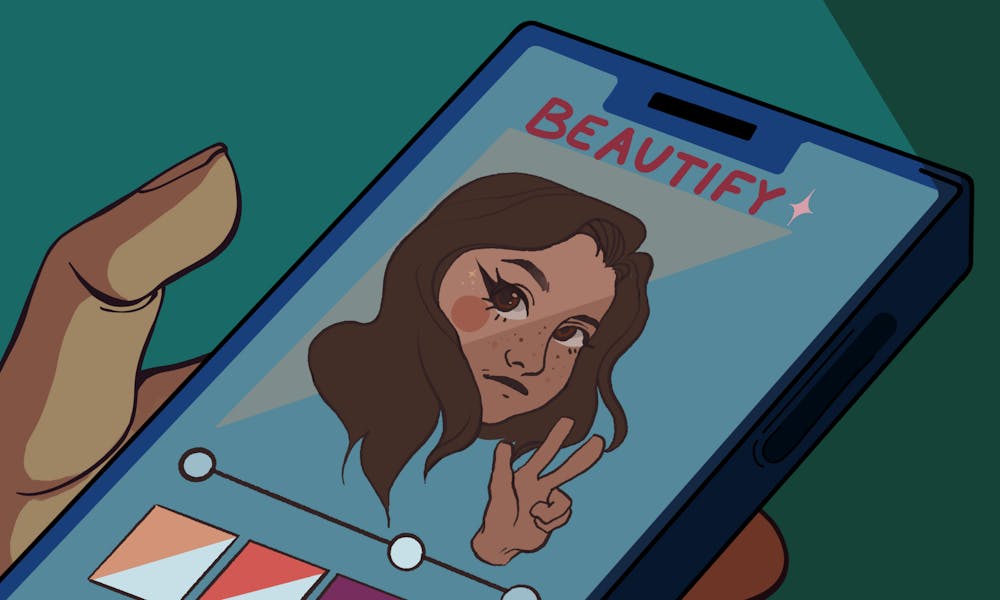TikTok workouts. Keto diets and juice cleanses. Fight the "freshman 15" and avoid comfort food—but insecurity is ugly too. How are we supposed to negotiate self love with a gnawing societal pressure to be thinner, prettier, and somehow, better?
Body image has never been a hotter topic, especially as the COVID–19 pandemic has stressed the resiliency and ever–changing shape of our corporeal forms. At face value, it seems like many of our favorite brands and celebrities use social media to propagate body positivity—from Rihanna’s expansive range of foundation shades to the sudden worship of plus sized models like Ashley Graham. But in reality, are fashion and beauty companies working in our favor to contend the patriarchal assessment of the female ideal? Are celebrities who preach self love genuine if their Facetune Instagram posts? Or are they continuing to feed off existing female insecurity under the guise of #BoPo?
The clutches of Photoshop's fantasy land are far–reaching. Just take Khloé Kardashian’s response to an unedited photo of her that got leaked to the media by her grandmother as an example. After attempting to wipe the earnest photo from the internet, the reality star admitted to struggling with body image her entire life while in the public eye. According to her latest Instagram post, which features unedited videos and photos of her body, the Kardashian grappled with the pressure of meeting external beauty standards, especially when compared to her family. Kardashian lamented that she has always felt like the “ugly sister,” the “fat sister,” and “conditioned to feel … not beautiful enough” being herself.
But right as she teetered on the edge of body positivity, Kardashian walks back her body positive rhetoric: “I love a good filter, good lighting and an edit here and there. The same way I throw on some make–up, get my nails done, or wear a pair of heels … it’s exactly what I will continue to do unapologetically.”
Wearing makeup and slimming down thighs with photo editors before posting isn't shocking in our digital–first, image–obsessed era. But considering Kardashian's attempts to address body image by posting pictures of her 'natural' self, the hypocritical commentary represents just how ingrained beauty standards are within our society. While showing off her toned, hourglass, nearly nude figure to over 100 million followers—many of whom are insecure teenage girls—the message of accepting inner beauty gets lost in Kardashian’s pursuit of perfecting her own image.
Next, let’s turn to Sports Illustrated's Swimsuit Edition.
The company recently released its 2021 Swim Search finalists, which features a diverse selection of 15 potential bathing suit models. According to their website, one of Swim Search’s goals this year was to represent different kinds of beauty. “As our audience evolves, as the conversation around beauty, size, race and gender change, we are working even harder to celebrate unique beauty,” Sports Illustrated explains before introducing their fifteen Swim Search Finalists via embedded Instagram posts.
True, the magazine did a great job incorporating diversity—diverse in the sense of representing different ethnicities, genders, and sexual orientations. But when you actually look into the physiques of Sports Illustrated’s "diverse" finalists, we still find that beauty’s definition is limited by societal ideals.
Immediately, readers seeing the finalists for the first time are slapped in the face with an array of models, who, almost ironically, write soliloquies about accepting self acceptance. Their social media profiles feature professional photoshoots—perfect lighting, hair and makeup done paid for, tight poses. While some of this self promotion is expected from potential swimsuit models, Sports Illustrated's Swim Search finalists reflect nothing new in "beauty." All are young and shaped like Coke bottles. But, worst of all, they all promote insincere natural self–love rhetoric.
Today's beauty standard is hopelessly inauthentic. Models have always been contrived—from their plucked eyebrows to their forced smiles. But thanks to technology, body images are seemingly always a little falsified with the help of airbrushing, Photoshop, and filters. What is this "natural beauty" companies are trying to sell to us? All we see in magazines are faces that aren't quite real.
The beauty standard has in no way broadened; if anything, marketable beauty is less attainable than ever, and that unattainability is now promoted more widely. For Sports Illustrated, a rebranded Swimsuit Edition is a boon—they can check the diversity box and reach more potential readers.

Beyond the shallow politics of fashion, it’s obvious that many attempts of promoting body positivity and inclusivity are superficial, executed primarily for the brownie points of surface level geniality. When it comes down to it, social media and fashion companies rely on the construct of unattainable perfection to ensure the insatiability of the consumer. Beauty is now a never–ending pursuit that can be captured, if only for a moment, with the aid of bronzer and eyelash extensions, and lip filler, and Facetune. And is fair for that to exist next to proclamations of self–love?







